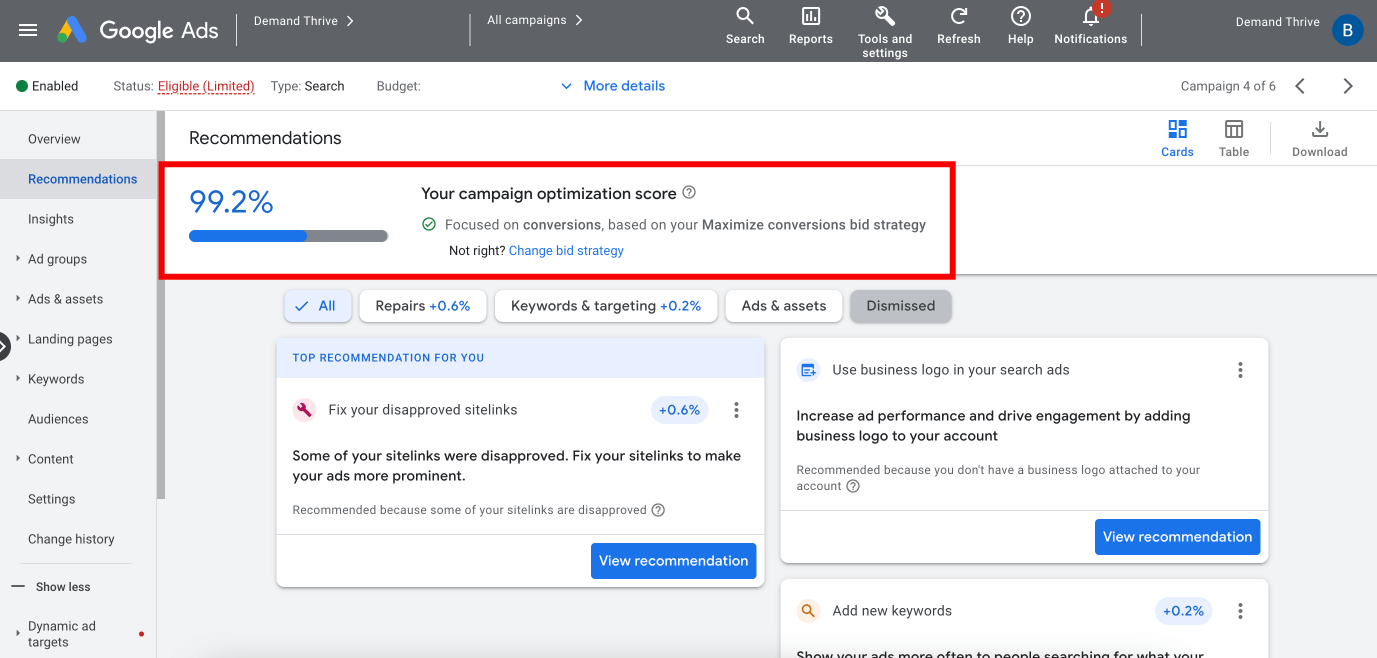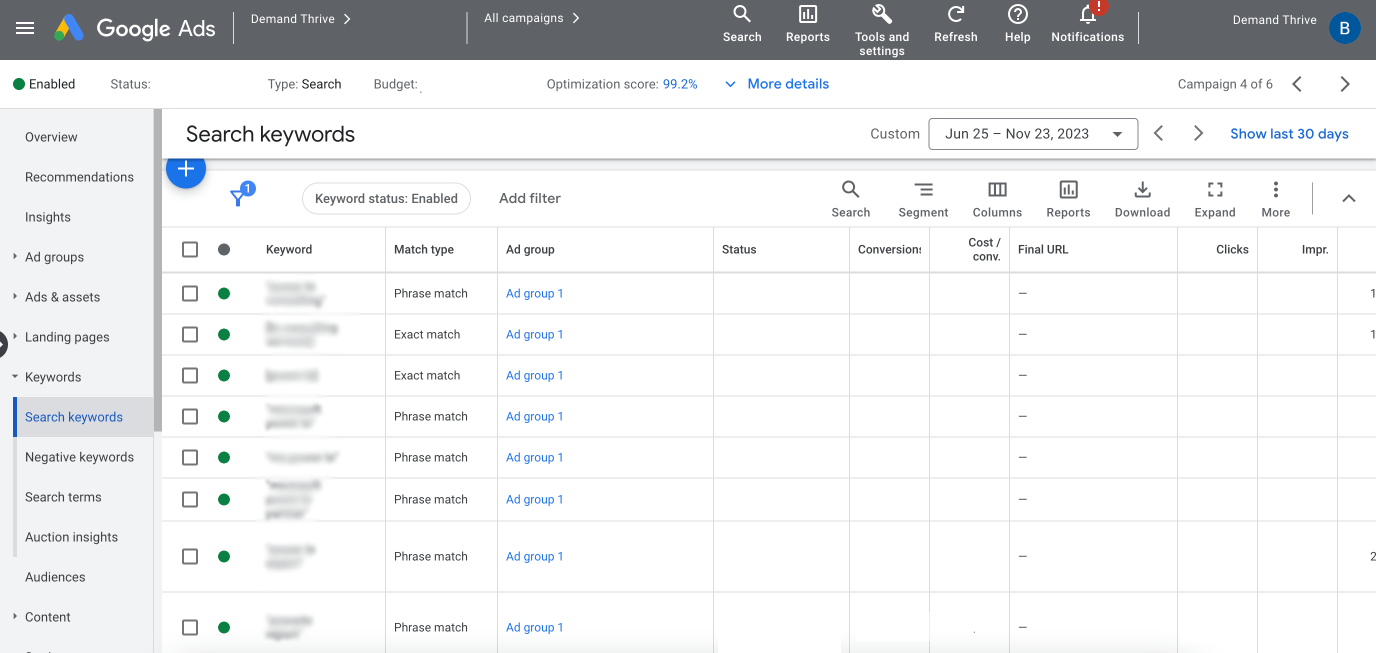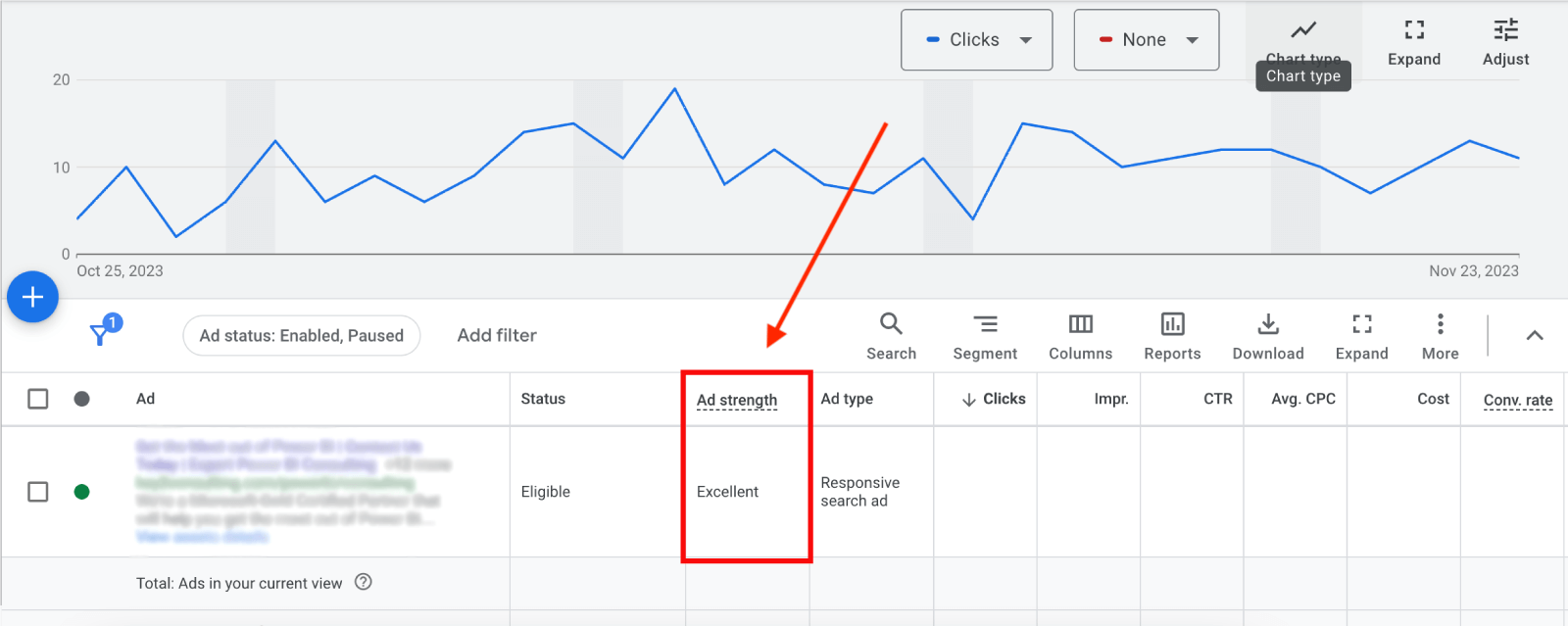Advertising on Google can be a highly valuable endeavor for a lot of companies. Over 75% of businesses across the globe use Google Ads for their pay-per-click marketing (source).
Though running ads on Google is certainly not a silver bullet for your marketing, it’s almost always an important digital marketing strategy to seriously consider, and almost always one that should play some role in a company’s digital marketing.
Achieving Google Ads success can sometimes be challenging, especially for businesses in highly competitive industries and markets. It can also be difficult if your business doesn’t have the resources or knowledge to succeed with Google Ads.
So I thought it’d be helpful to share some of the most important things you can do to maximize your Google Ads success!
Let’s dive in.
1. Optimization Score
“Optimization Score” in the Google Ads platform is really important. It’s essentially a numerical score for how well your campaign is set up.

Below your Optimization Score, you will see “Recommendations” for how to improve your campaign. These recommendations are generated by the AI and machine learning capabilities of the Google Ads platform.
A key to success here is knowing which recommendations to accept (when you accept a recommendation, the ad platform often times takes care of the change for you) and which ones to ignore.
For example, something I’ve really learned is that Google often recommends you add more “Broad Match” keywords to your keyword lists.
Without getting too in the weeds, choosing broad match keywords will show your ads to a wider audience, but this frequently doesn’t lead to the best return on investment, because your ad can be shown for searches you don’t necessarily want your ad appearing for.
I’ve found the most success with “Phrase Match” keywords instead of “Broad Match,” but that’s not always the case.
The bottom line is that it’s important to maximize your Optimization Score by reviewing the Google Ad platform’s recommendations. The secret sauce is making good decisions on what recommendations to implement, how those recommendations should be implemented, and when to implement them!
2. Keyword Performance
There are several factors that affect the success of your ads, none smaller than the keywords you choose and their performance. Routinely reviewing the performance of your keywords is a must.
You want to consistently look at important keyword metrics like the clicks a keyword generates, the impressions a keyword generates, the keyword’s Click-Through-Rate (which is a measure of that keyword’s effectiveness), what each keyword is costing you, and so on.

This is the beating heart of your Google Ads. You must constantly measure keyword performance and make adjustments.
Furthermore, it’s good to pay attention to keyword “Match Type” and the performance there.
For instance, for one of our clients, we had a broad match keyword that was generating a bunch of clicks, but it wasn’t resulting in many conversions. As a result, the keyword was extra expensive, not only for the high number of clicks, but also for the lack of leads it was generating. Not good!
Instead of pausing or removing keywords like that, you can change the match type to either PHRASE match or EXACT match and potentially get better results.
In summary, consistently measuring keyword performance is critical to achieving Google Ads success!
3. Ad Strength
In addition to other important factors like budget and keywords, your “Ad Strength” plays a crucial role in how often your ad is seen (or “served”).

What is Ad Strength? If you hover over Ad Strength in the Google Ads platform (Go to “Ads” then “Ads and Assets”), you’ll see a popup, which says:
“Ad strength is an indication of the relevance and diversity of your ad combinations. Having more relevant and unique content can help you get the right ad in front of your customers and improve your ad’s performance.”
Ad Strength is scored on this scale:
- Incomplete
- Poor
- Average
- Good
- Excellent
As you can see in the above screenshot of one of our client’s Google advertisements, the Ad Strength is “excellent.” This is what you want!
Here’s an important stat right from Google’s documentation on Ad Strength that I wanted to share:
“Advertisers who improve Ad Strength for their responsive search ads from “Poor” to “Excellent” see 12% more conversions on average*.”
That’s huge! Make sure you optimize Ad Strength.
4. Quality Score
Alright, for my fourth and final key for Google Ads success…maximizing your ad’s Quality Score is pivotal! Quality Score is an evaluation the Google Ads platform makes on the quality of your advertisement.
Put simply, the higher your quality score, the more likely it will be shown to people in Google Search.
If you have a low quality score for a bunch of your keywords, your ad won’t be shown as frequently. This leads to wasted time and poor results…not good!
In order to see Quality Score, go to “Search Keywords” and locate the Quality Score column in the chart.

Quality Score can be a tricky thing to get right. In fact, I recently posted on X about this…
Yes! And unfortunately many businesses aren’t aware of this. If you want your Google Ads to perform well, you have to optimize for quality score. https://t.co/eiTB071JR1
— Brad Lathrop (@BradLathrop) November 6, 2023
What is Quality Score? It’s a measurement that has three major components:
- Expected Click Through Rate
- Ad Relevance
- Landing Page Experience
For the sake of not making this blog post too long, check out Google’s official documentation and this excellent article from SEMRush (the one I quoted in my X post above) for more information on Quality Score!
In Closing
In summary, four best practices for Google Ads success I shared in this article were:
- Maximize Optimization Score
- Constantly review keyword performance & adapt
- Maximize Ad Strength
- Maximize Quality Score
While there are certainly other keys for Google Ads success, these four of some of the most important!
If you need help with advertising on Google, please feel free to contact us! Thank you for reading!

